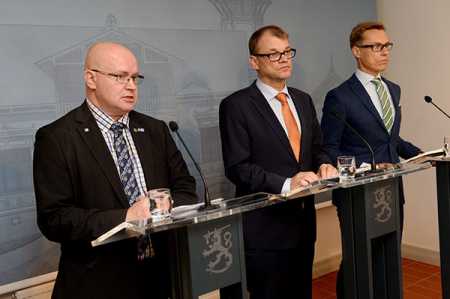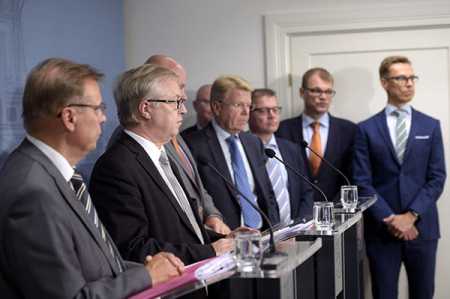|
Tue, 29 Sep, 2015 12:04:40 AM Labour Orgs get more time for alternative proposals FTimes – STT Report, Sep 29  Justice and Labour Minister Jari Lindström, Prime Minister Juha Sipilä and Finance Minister Alexander Stubb a press conference announced government decision on holiday bonus at Kesäranta in Helsinki on Monday. Photo – Lehtikuva. The government on Monday evening suddenly announced that it would not reduce Sunday or overtime pay, opting instead to slash holiday pay by 30 percent.
“Through this new law, everyone will have a right to holiday pay. Until now, that was not the case,” said Prime Minister Juha Sipilä.
Sipilä told the government that the holiday bonus cuts were fairer and easier than cutting Sunday and overtime wages.
“We have heard the positions of nurses, midwives, especially women in low-paid sectors, as well as police officer and fire-fighters and others,” the Prime Minister explained.
The government said they had gone through the issues with the trade unions.
In addition to the proposed cuts of Sunday and overtime pay, the government has caused friction with the so-called mandatory law as a precondition to the social contract negotiations.
“For us, it is very important that the social contract continues. This is why we have changed the mandatory part of the law, which comes into effect, if no collective agreement is passed in the next three years,” Sipilä added.
The government will submit a report to parliament regarding their own activities in enhancing the competitiveness of Finnish businesses.
Meanwhile, the labour market organizations are also continuing discussion on their joint alternative agreement.
The deadline set by Sipilä expired on Monday, but he gave the organizations a few weeks additional time.
“During this process, so many concrete measures have been laid upon the table, that I have requested that the labour market organisations continue their discussions,” Sipilä said.
The frozen negotiations are being pushed ahead by putting tightened wage issues on the table.
The government's aim has been to improve the competitiveness of Finland directly by undermining working conditions, but also by contributing to moderate wage agreements.
Now all issues are on the table during the negotiations, especially concessions to SAK.
According to the President and Chief Executive Officer of The Confederation of Finnish Industries (EK), Jyri Häkämies, wages must be agreed upon in the federal negotiations, not through a centralized wage solution.
EK has proposed a coordinated federal collective bargaining rounds, modelled after a Swedish solution, where internationally competing export industries determine the salary cap.
“Now we will see whether the creation of such a new type of collective bargaining rounds is possible,” Häkämies said.

Labour organisations leaders Lauri Lyly, Sture Fjäder, Antti Palola, Jyri Häkämies, Jalonen, Labour and Minister of Justice Jari Lindström, Prime Minister Juha Sipilä and Finance Minister Alexander Stubb at a press conference in Kesäranta, Helsinki on Monday. Photo – Lehtikuva. The government is also playing it safe. Next autumn, the government's petitions for wage moderation would be likely to fall on deaf ears, if it follows through with its own threatened budget cuts.
The government put together their own social agreement package after labour market organisations twice failed miserably to create a new agreement.
According to AKAVA chairman Sture Fjäder, the labour organisations have a strong motivation to prevent the government's threats, because the proposed actions unfairly punish different sectors.
“We will soon have 400,000 unemployed in Finland. We need to change that,” Fjäder said.
According to Jyri Häkämies, four out of five organisations would have been ready to sign the social contract as early as Monday. The only opponent was SAK.
“I'm still of the mind that we're at the negotiating table, seeking a solution,” SAK chairman Lauri Lyly said.
More News
|
|
Finland Times
| Tuesday, 18 November, 2025 |

